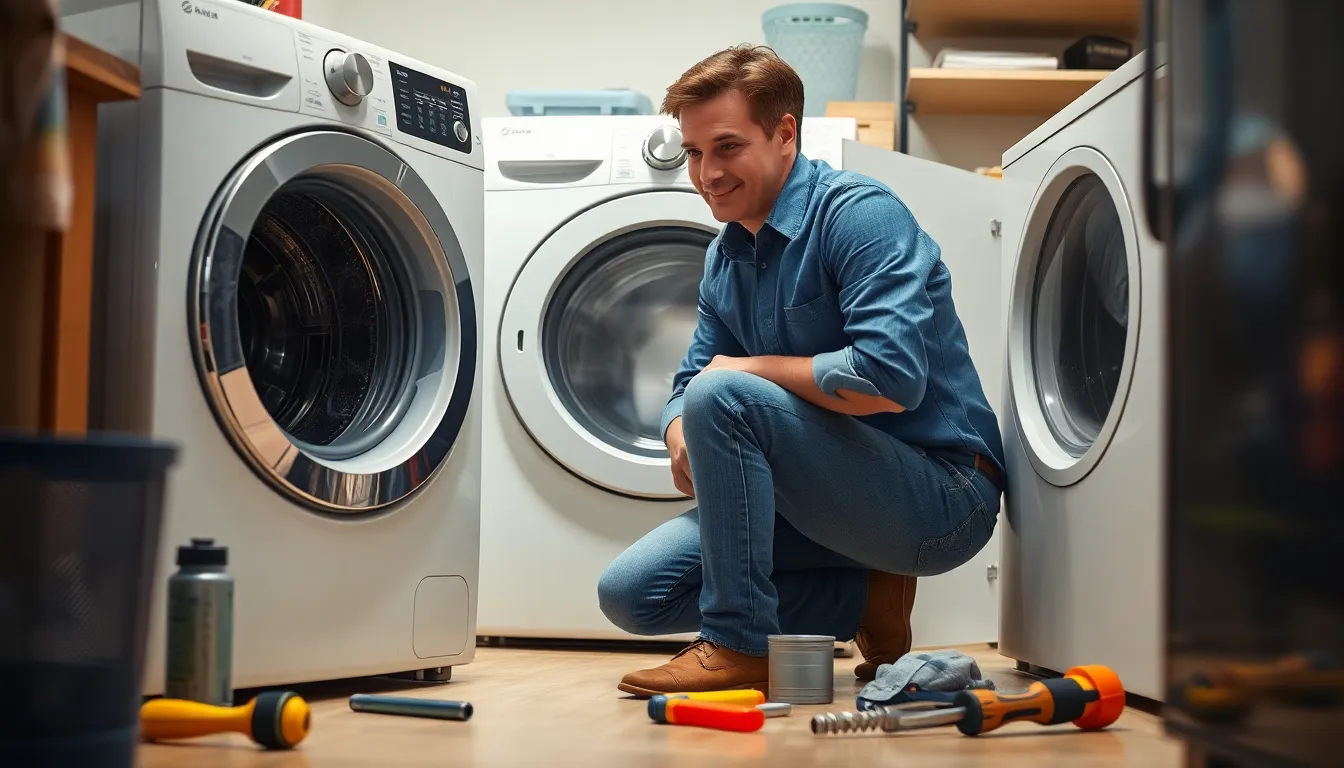Home appliances play a crucial role in daily life, making tasks easier and more efficient. When these essential devices break down, it can disrupt routines and create stress. Understanding the basics of home appliance repair not only saves time but also money, allowing homeowners to tackle minor issues without calling a professional.
From refrigerators and washing machines to microwaves and dishwashers, each appliance has its quirks and common problems. With a little knowledge and the right tools, many repairs can be done quickly and effectively. This guide will explore key tips and tricks for diagnosing and fixing common appliance issues, empowering homeowners to take control of their household maintenance.
Table of Contents
ToggleOverview of Home Appliance Repair
Home appliance repair involves diagnosing and fixing issues with appliances critical to daily life. Appliances like refrigerators, washing machines, microwaves, and dishwashers each present unique challenges. Regular maintenance and timely repairs extend their lifespan and optimize performance.
Understanding common problems specific to each appliance helps homeowners identify issues early. For instance, a refrigerator may exhibit temperature fluctuations or unusual noises. Washing machines can experience drainage problems or spin cycle failures. Recognizing these signs allows for prompt action, potentially avoiding costly repairs.
Basic troubleshooting techniques can save homeowners money. Checking for loose connections, replacing faulty parts, and ensuring proper settings can resolve many minor issues. Proper documentation, including manuals and warranties, aids in efficient repairs and parts replacement.
Users often find various resources, such as instructional videos and repair forums, helpful. Engaging with communities focused on appliance repair fosters knowledge sharing and support. Homeowners are encouraged to explore these resources for specific guidance on their appliances.
Common Home Appliances Needing Repair

Identifying common issues with home appliances can help homeowners address problems quickly. Understanding the specific problems appliances encounter allows for faster resolutions and reduces the stress associated with unexpected breakdowns.
Refrigerators
Refrigerators often experience temperature irregularities. Common problems include warm interiors, which can arise from faulty thermostats or blocked vents. Condensation buildup may signify door seals needing replacement. Regularly checking the condenser coils for dust and debris can enhance efficiency and prevent overheating.
Washers and Dryers
Washers and dryers frequently encounter drainage and spinning issues. Clogged hoses can prevent proper water flow, leading to excess moisture. Unbalanced loads can cause dryers to vibrate excessively or fail to heat properly. Inspecting lint filters and ensuring proper connection of hoses can improve performance and extend longevity.
Ovens and Ranges
Ovens and ranges commonly face ignition problems and uneven heating. Faulty ignitors prevent gas ranges from lighting properly, while electric ranges may show temperature inconsistencies. Checking heating elements and ensuring proper calibration can resolve various cooking issues. Regular maintenance, including cleaning burners and inspecting gas lines, contributes to safer, more efficient appliance operation.
Signs You Need Professional Repair
Home appliances display specific symptoms that indicate a need for professional repair. Recognizing these signs early can prevent further damage and costly repairs.
Unusual Noises
Unusual noises from appliances often signal underlying issues.
- Refrigerators: Loud humming or clicking may suggest problems with the compressor or fan.
- Washing Machines: Excessive banging during cycles can indicate unbalanced loads or worn-out drum bearings.
- Ovens: Hissing or popping noises might point to gas leaks or electrical malfunctions.
When appliances produce strange sounds, professional evaluation helps identify and resolve potential hazards.
Temperature Problems
Temperature problems affect the efficiency and function of several home appliances.
- Refrigerators: Inconsistent cooling often relates to faulty thermostats or defrost issues.
- Ovens: Uneven heating during cooking is usually caused by defective heating elements or improper calibration.
- Dishwashers: Inadequate water heating can lead to poor cleaning results and may stem from heating element failure.
Addressing temperature inconsistencies promptly through professional repair ensures appliances operate efficiently and safely.
DIY Repair vs. Professional Repair
Homeowners often face the decision of whether to tackle appliance issues themselves or hire a professional. The right choice depends on the problem’s complexity and the homeowner’s skill level.
When to DIY
Homeowners can confidently undertake repairs for minor issues that are straightforward and pose no safety risks. For instance, when a refrigerator’s interior light bulb burns out, replacing it requires minimal tools. Similarly, unclogging a washing machine hose or cleaning condenser coils on refrigerators might only need basic knowledge and some mechanical aptitude. Homeowners should feel comfortable performing repairs when:
- The problem is common and well-documented.
- Clear instructions are available online.
- They possess the necessary tools.
Any signs of more complex problems, including electrical issues or internal component failures, should prompt homeowners to consider professional help for safety.
Benefits of Professional Services
Professional appliance repair services provide several advantages that may outweigh DIY attempts. Certified technicians offer:
- Expertise: Professionals possess extensive training and experience, making them skilled in diagnosing and fixing appliance issues efficiently.
- Warranty Protection: Using a professional service often helps maintain manufacturer warranties, ensuring coverage for future repairs.
- Time Savings: Professionals can address issues quickly, allowing homeowners to avoid lengthy troubleshooting.
- Safety Assurance: Professionals handle high-risk repairs safely, particularly when electricity or gas is involved.
Choosing professional services effectively minimizes long-term risks and potential additional repair costs, ensuring appliances operate reliably and safely.
Cost Factors in Home Appliance Repair
Understanding cost factors in home appliance repair helps homeowners make informed decisions. Several elements influence repair expenses, including:
Appliance Type
Appliance types greatly affect repair costs. For example, refrigerators and washing machines typically incur higher repair expenses due to their complexity, while easy-to-repair appliances like microwaves generally involve lower costs.
Age of Appliance
The age of an appliance plays a significant role in repair pricing. Older models may require more expensive parts and could have difficulties sourcing components, leading to increased repair costs compared to newer models.
Warranty Status
Warranty status impacts repair expenses. Appliances under warranty might cover repair costs, while those without can lead to out-of-pocket expenses. Reviewing warranty terms is crucial before proceeding with repairs.
Nature of the Problem
The nature of the repair significantly influences costs. Minor repairs, such as replacing a fuse or a door seal, often lead to small expenses. Complex issues, such as compressor failures in refrigerators, can result in considerably higher costs.
Labor Costs
Labor costs vary based on location and the service provider. Regions with a higher cost of living typically present higher labor rates. Additionally, specialized technicians may charge premium rates for their expertise.
Parts Availability
Parts availability affects repair costs, especially for older or less common appliances. Hard-to-find components can drive costs up due to shipping fees or markups from suppliers.
Repair Urgency
The urgency of the repair may impact pricing. Immediate service requests frequently incur additional fees or overtime charges, while standard appointments might present lower costs.
Service Provider
The reputation and experience of the service provider influence overall expenses. Established companies with strong track records may charge higher rates but often deliver quality service and guarantee their work.
By considering these cost factors, homeowners can better navigate appliances’ repair expenses, ensuring they make educated choices when addressing issues.
Mastering home appliance repair can significantly improve daily life. With the right knowledge and tools homeowners can tackle minor issues and save both time and money. Understanding common problems and employing basic troubleshooting techniques empowers individuals to maintain their appliances effectively.
Recognizing when to seek professional help is equally important. For complex issues involving electrical components or safety concerns professional services provide expertise and peace of mind. By weighing the costs and benefits of DIY repairs versus hiring professionals homeowners can make informed decisions that enhance the longevity and efficiency of their appliances. Embracing this proactive approach to home maintenance leads to a smoother and more efficient household.


